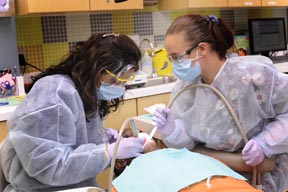With the largest grant in the history of the University of Alabama at Birmingham, School of Dentistry researchers will lead an effort that not only could improve the nation’s dental health but its overall health as well.

Oral health has been called the window to one’s general health, and this new national effort aims to provide people on the frontline of oral health care — community dentists in private practice — the opportunity to be on the forefront of research that addresses day-to-day issues they face with patients.
A seven-year, $66.8-million grant to UAB from the National Institute of Dental and Craniofacial Research, part of the National Institutes of Health, will create a national dental practice-based research network, consolidating the institute’s former three regional research networks into a single, nationally coordinated effort.
The network is a unique investigative union of real-world practicing dentists and academic scientists, says the grant’s principal investigator Gregg Gilbert, D.D.S., M.B.A., professor and chair of the UAB Department of General Dental Sciences. Dentists in private practice will be able to propose and/or participate in research studies that address the issues they face treating patients. The studies then will be conducted in participating dental offices to help quickly expand the profession’s evidence base and improve patient care.
“This network is designed to engage the end-user — dentists — from the outset,” Gilbert says. “We want to know from community dental-care providers and their patients what their most pressing clinical practice issues are, then conduct national oral-health studies to improve dental care. We hope to improve the nation’s oral health by improving the knowledge base for clinical decision-making and moving the latest evidence into routine care.”
The consolidated initiative, named The National Dental Practice-Based Research Network, will be headquartered at UAB, which will be the national administrative center leading and overseeing six smaller regional research centers located in Birmingham; Rochester, NY; Gainesville, Fla.; Portland, Ore.; Minneapolis; and San Antonio.
Since launching the first practice-based initiative in 2005, NIDCR had supported three regional networks, including one at the UAB School of Dentistry. Each had its own affiliated practitioners, clinical studies and administrative tasks independent of the other.
“A national coordinating center streamlines the network structure for greater financial and administrative efficiency,” says NIDCR director Martha Somerman, D.D.S., Ph.D. “The national hub-and-spoke structure also should free up those at the regional networks to focus almost solely on research. So, it’s an excellent opportunity for everyone.”
“We are thrilled that the UAB School of Dentistry has been selected to lead this important national research effort,” says Michael Reddy, D.M.D., D.M.Sc., dean of UAB’s School of Dentistry. “This network gives the people providing the bulk of dental care a voice in the science behind patient care.
“Through this effort we are poised to transform oral health and dental education and be a model for all health-care education. I firmly believe this will change future practice,” Reddy says.
“This grant is a ringing affirmation of UAB’s continued national leadership in research and care, of our ability to secure very competitive federal research funding and of our longtime culture of collaboration that thrives on a regional and national scale,” says UAB President Carol Z. Garrison.
Gilbert hopes that both general dentists and dental specialists participate actively in the research network. This will broaden the network’s perspective and allow it to investigate the role of specialized care.
Gilbert says another important aspect of this network is the participation of community practitioners at every step of the process, including authoring articles for peer-reviewed journals and presenting at national meetings.
Various studies during the past decade have shown evidence that heart disease, diabetes, HIV/AIDS and osteoporosis can first manifest in the mouth. Dentists are likely the first health-care provider to notice the changes linked to these diseases, which if treated early, usually can be prevented or successfully controlled.
“This network is different than anything done before,” Gilbert says. “This will not be academicians telling community practitioners what to do. This will be the nation’s network, tapping into the immense amount of practical clinical expertise that resides in the community.
“We want all key stakeholders to join us in the excitement of research discovery and continuous quality improvement for the benefit of all patients," Gilbert adds. "That means community practitioners helping to write research papers for peer-reviewed journals and making research presentations nationally and even internationally. This network truly seeks to change the ways that dental practitioners think about what they are doing on a daily basis, including the scientific basis for how they approach patient care."
In addition to Gilbert, Sonia Makhija, D.D.S., M.P.H., assistant professor in the UAB Department of General Dental Sciences, will be the national director of communications and dissemination for the project, ensuring research information reaches practices and is implemented.
